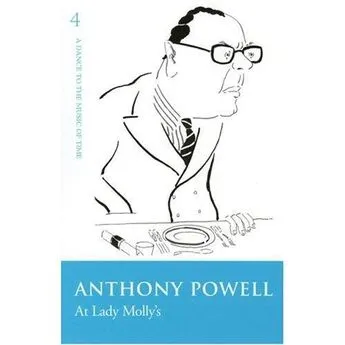Anthony Powell - At Lady Mollys
- Название:At Lady Mollys
- Автор:
- Жанр:
- Издательство:неизвестно
- Год:2005
- ISBN:нет данных
- Рейтинг:
- Избранное:Добавить в избранное
-
Отзывы:
-
Ваша оценка:
Anthony Powell - At Lady Mollys краткое содержание
A Dance to the Music of Time — his brilliant 12-novel sequence, which chronicles the lives of over three hundred characters, is a unique evocation of life in twentieth-century England.
The novels follow Nicholas Jenkins, Kenneth Widmerpool and others, as they negotiate the intellectual, cultural and social hurdles that stand between them and the “Acceptance World.”
At Lady Mollys - читать онлайн бесплатно полную версию (весь текст целиком)
Интервал:
Закладка:
‘Did I hear you say you had met Mildred before?’
He spoke anxiously.
‘When I was about nine or ten.’
‘What on earth do you mean?’
He sounded quite angry at this statement of mine, intended to set his mind at rest. He supposed I wanted to tease him.
‘Just what I said. It was years ago — with her sister, Mrs. Conyers, to whom you were introduced a second ago. My family have always known General Conyers.’
I hardly knew why I added this last piece of information which sounded somehow a trifle absurd and unnecessary, emphasing the fact that Widmerpool and the General would become brothers-in-law. However, Widmerpool was appeased by this amplification.
‘Quite so,’ he said. ‘Quite so.’
All at once he became abstracted in manner.
‘Look here,’ he said. ‘Come and have luncheon with me. We haven’t had a talk for a long time. What about next Sunday — at my club?’
‘All right. Thanks very much.’
The name of the club surprised me a little. There was no reason at all why he should not belong there, yet its mild suggestion of cosmopolitan life and high card stakes evoked an environment seemingly unsuited to his nature. When employed at Donners-Brebners, Widmerpool must have spent a fair amount of his time with foreign businessmen. Indeed, his professional background at that time might well have been described as international. There was nothing against him on that count. Equally, if he ever played cards, he might, for all I knew, venture high stakes. He could presumably afford such a risk. Neither of these aspects of the scene altered the sense of incongruity. To eyes that had known him as a boy, even the smallest pretension to swagger appeared, for Widmerpool, out of place. That was the point. The verdict was inescapable. Only an atmosphere of quiet hard work and dull, serious conversation were appropriate to him. Such a demand on my part, even though unvoiced, was, of course, absurd. Widmerpool’s conduct was, in any case, no concern of mine. Besides, these sentiments were utterly at variance with Widmerpool’s own view of himself; a view that would obviously play the chief part in his choice of club — or, for that matter, of wife. If such a club was inappropriate to him, how much more incongruous would be a wife like Mrs. Haycock. I could not help thinking that. We talked for a time of general matters. Later on Lovell came across the room.
‘I am giving Priscilla Tolland and her friend a lift home,’ he said. ‘Do you want to be taken as far as your flat?’
I had no difficulty in perceiving the reason for this offer and resigned myself to sitting in the back with the friend.
‘Come and see us again,’ said Molly Jeavons, when saying good-bye. ‘Make Chips bring you, or just drop in.’
‘So long, old man, come again,’ said Jeavons.
He had been standing for a long time by the drink tray, plunged in deep thought, perhaps still contemplating the subject of film stars and their varied, disturbing charms. Now he took me by the hand, as if his thoughts were far away. I followed Lovell and the girls downstairs to the car. Outside there was a hint of fog in the air. The river mist seemed to have pursued us from the Studio. Nothing of note happened on the way home. The school friend talked incessantly of the visit she was going to pay to Florence. We dropped her at an address in Wimpole Street, after disposing of Priscilla Tolland at her stepmother’s house in Hyde Park Gardens.
2
‘We might go straight in to lunch,’ said Widmerpool, when we met a day or two later. ‘If you so wish, you can drink a glass of pale sherry at the table. We are sometimes crowded at the luncheon hour. Incidentally, you will probably see the Permanent Under-Secretary of the Home Office at one table. He honours us with his presence most days — but I forgot. It is Sunday today, so that he may not be with us. I am afraid, now I come to think of it, that it is a long time since I went to church. I shall attend a service next week when I stay with my mother in the country.’
‘How is your mother?’
‘Better than ever. You know she literally grows younger. A wonderful woman.’
‘Does she still have the cottage near Hinton?’
‘It is a little small, but it suits us both. We could well afford something larger nowadays, but she loves it. Her roses are the admiration of the neighbourhood.’
‘You still see something of the Walpole-Wilsons and Sir Magnus Donners?’
‘The Walpole-Wilsons I have lost all touch with,’ said Widmerpool. ‘Sir Magnus is, of course, an old friend. Whatever his faults — some of which it would be foolish to disregard — he has rendered me in the past inestimable service. As it happens, he has not asked me over to Stourwater recently. I must ring him up. But come along. To lunch, to lunch.’
He spoke with that air of bustle that infected all his dealings. During the few seconds in which we talked he had managed to convey the sensation that we were physically too close together. More than once I edged away. He seemed all the time pressing at one’s elbow, like a waiter who breathes heavily over you as he irritably proffers a dish awkward to handle. Widmerpool, too, gave the impression of irritation, chronic irritation, as if he felt all the time that the remedy to alleviate his own annoyances lay in the hands of the people round him, who would yet at the same time take no step to relieve his mounting discomfort; for his manner conveyed always a suspicion that he knew only too well that things were almost as bad for those who were with him as for himself.
He swept me forward into the dining-room. The club steward, no doubt familiar with Widmerpool’s predispositions, indicated a table by the window, flanked on one side by two yellow-faced men conversing in suited, sing-song French: on the other, by an enormously fat old fellow who was opening his luncheon with dressed crab and half a bottle of hock. One of the men talking French I thought I recognised as the Balkan diplomatist seen at the Jeavonses and said to be of Prince Theodoric’s entourage.
‘Have anything you like to eat or drink,’ said Widmerpool. ‘Consult the menu here. Personally I am on a diet — a little gastric trouble — and shall restrict myself to cold tongue and a glass of water.’
He handed me the card, and I ordered all I decently could in the face of this frugality.
‘You are still — publishing — advertising ?’ he asked.
‘Was it not something of the sort?’
His manner of asking personal questions was of that kind not uncommonly to be found which is completely divorced from any interest in the answer. He was always prepared to embark on a lengthy cross-examination of almost anyone he might meet, at the termination of which — apart from such details as might chance to concern himself — he had absorbed no more about the person interrogated than he knew at the outset of the conversation. At the same time this process seemed somehow to gratify his own egotism.
‘I was in publishing. Art books. Now it is the film business.’
‘Indeed? What unusual ways you choose to earn a living. Not acting, surely?’
‘Hardly. I am on what is called the “scenario side”. I help to write that part of the programme known as the “second feature”. For every foot of American film shown in this country, a proportionate length of British film must appear. The Quota, in fact.’
‘Ah, yes, the Quota, the Quota,’ said Widmerpool, cutting short any further explanation, which would certainly have been tedious enough. ‘Well, I never expected to sit at the same table as host of a man who wrote films for the Quota. Do you like the work?’
‘Not greatly.’
‘It may lead to something better. If you are industrious, you get on. That is true of all professions, even the humblest. You will probably end up in Hollywood, or somewhere like that. But tell me, do you still see those friends of yours, Stringham and Templer?’
‘Stringham I haven’t seen since the night he got so tight, and you and I helped to put him to bed. I rang up a day or two later and found he had gone abroad. From what I hear, he is drinking enough to float a battleship. There was even a question of taking a cure.’
‘And Templer?’
‘I see him occasionally. Not for rather a long time, as it happens. You know his marriage broke up?’
‘Like Stringham’s,’ said Widmerpool. ‘Your friends do not seem very fortunate in their matrimonial ventures. I run across Templer sometimes in the City. We have even done a little business together. I was able to fix up a job for Bob Duport, that rather disreputable brother-in-law of his.’
‘So I heard.’
‘Oh, he told you, did he?’ said Widmerpool, gratified at this action of his being so widely known. ‘I believe there were various repercussions from that good turn I was able to do him. For instance, Duport was living apart from his wife. He had behaved rather badly, so people say. When he got this job, the two of them patched things up again, and she went back to him. I was glad to have been the cause of that. We all three had dinner together. Rather an odd woman. Moody, I should think. She didn’t seem particularly pleased at the reunion. Not at all grateful to me, at least.’
‘Why not?’
‘I couldn’t say. She hardly spoke a word throughout the course of an extremely good dinner at the Savoy. I may say it cost me quite a lot of money. Not that I grudge it. They are in South America now, I believe. Did you ever meet either of them?’
‘Met him once with Templer when I was an undergraduate.’
‘And her?’
‘I knew her a bit. In fact I first met her ages ago when I stayed with the Templers. Peter’s father was still alive then.’
‘Not unattractive.’
‘No.’
‘Quite elegant in her way too.’
‘Yes.’
‘Too good for Duport, I should have thought.’
‘Possibly.’
Widmerpool could not have had the smallest notion of anything that had taken place between Jean Duport and myself; but people are aware of things like this within themselves without knowing of their own awareness. In any case, conscious or unconscious, Widmerpool had the knack of treading on the corns of others. His next question seemed to show the extraordinary telepathic connection of ideas that so often takes place in the mind when anything in the nature of being in love is concerned.
‘You are not married yourself, are you, Nicholas?’
‘No.’
‘Not — like me — about to take the plunge?’
‘I haven’t properly congratulated you yet.’
Widmerpool bowed his head in acknowledgment. The movement could almost have been called gracious. He beamed across the table. At that moment the prospect of marriage seemed all he could desire.
‘I do not mind informing you that my lady mother thinks well of my choice,’ he said.
There was no answer to that beyond agreeing that Mrs. Widmerpool’s approval was gratifying. If Mrs. Haycock could face such a mother-in-law, one hurdle at least — and no minor one, so it seemed to me — had been cleared.
‘There are, of course, a few small matters my mother will expect to be satisfactorily arranged.’
‘I expect so.’
‘But Mildred will fall in with these, I am sure.’
I thought the two of them, Mrs. Widmerpool and Mrs. Haycock, were probably worthy of the other’s steel. Perhaps Widmerpool, in his heart, thought so too, for his face clouded over slightly, after the first look of deep satisfaction. He fell into silence. When pondering a matter of importance to himself, his jaws would move up and down as if consuming some immaterial substance. Although he had finished his slices of tongue, this movement now began. I guessed that he intended to pose some question, the precise form of which he could not yet decide. The men with yellow faces at the next table were talking international politics.
Читать дальшеИнтервал:
Закладка:








